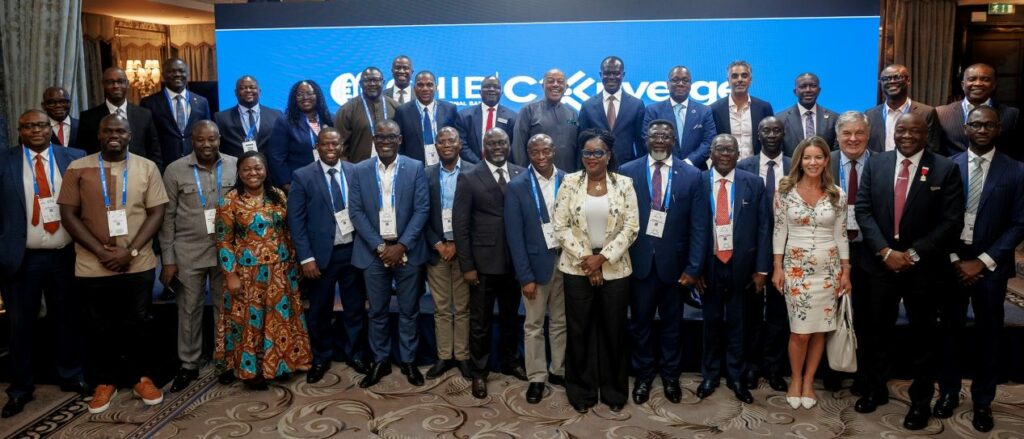Ghana International Bank (GHIB) has concluded the 2025 edition of GHIBCONVERGE, its flagship thought-leadership and impact forum, with a resounding call for Africa to shift decisively from raw commodity exports toward value-added trade, backed by sustainable finance and modern infrastructure.
The three-day event, held from 6 to 8 August in the City of London, convened policymakers, financiers, commodity executives, legal specialists, and development strategists from across Africa and the global market. This year’s theme, “Rethinking Commodity Finance for Growth”, framed a series of in-depth debates and collaborative sessions aimed at unlocking Africa’s long-delayed industrialisation.
Opening the conference, GHIB Chief Executive Officer Dean Adansi delivered a sobering assessment of Africa’s commodity export model, which he said continues to forfeit billions in potential earnings.
“We are sitting on untapped billions in export revenues because we continue to export raw cocoa instead of chocolate, raw gold instead of refined bullion, and raw cashews instead of processed kernels,” Mr Adansi told delegates. “The financing solutions exist, but they require alignment between banks, policymakers, and industry.”
He proposed a three-pronged strategy:
- Creation of dedicated value-addition funds,
- Expansion of structured trade finance for processing plants, and
- Establishment of risk-sharing frameworks between African and international lenders.
Mr Adansi further urged African regulators to harmonise standards under the African Continental Free Trade Area (AfCFTA), enabling processed goods to move freely and competitively across the continent.
In a high-level keynote session titled “Growing Africa Through Commodities”, Governor Buah Saidy of the Central Bank of The Gambia argued that commodities should serve as the anchor of macroeconomic stability.
“For too long, Africa’s commodity wealth has been exported in its rawest form, leaving value and jobs offshore,” he said. “By investing in domestic refining capacity, building regional value chains, and securing fairer terms of trade, we can anchor our currencies, strengthen reserves, and create lasting resilience in our economies.”
Ghana’s First Deputy Governor, Dr Zakaria Mumuni, reinforced that message, outlining the Bank of Ghana’s strategy to increase domestic gold refining capacity.
“Ghana’s long-term macroeconomic stability depends on our ability to capture more value from the commodities we produce,” Dr Mumuni said. “Expanding our domestic gold refining capacity is not just about increasing export revenues; it is about building resilience into our reserves, improving our trade balance, and ensuring that Ghanaians benefit more directly from the resources we own.”
On Day Two, Lord Paul Boateng, GHIB Board Member and former UK Cabinet Minister, made the case for treating Africa’s natural resources as strategic geopolitical assets.
“Critical minerals, cocoa, and gold are not just export lines in a trade ledger,” Lord Boateng argued. “They are bargaining chips in a changing global order. Africa must use them to secure technology transfer, infrastructure investment, and sustainable value chains.”
His remarks preceded a dynamic panel on the global race for critical minerals—particularly the metals needed for electric vehicle production and renewable energy infrastructure—where participants stressed the urgency of moving beyond extraction into refining and advanced manufacturing.
Across its three days, #GHIBCONVERGE 2025 hosted over a dozen panels and fireside chats covering the full spectrum of commodity finance. Highlights included:
- Commodity trade as a catalyst for economic renewal: Mapping Africa’s commodity profile, identifying financing gaps, and showcasing early successes in cocoa and cashew processing.
- Innovations in cocoa finance: How hybrid models and forward contracts can support both smallholder farmers and local processors.
- Minerals and petroleum finance: Balancing competitiveness with local content and environmental standards.
- AI and blockchain in trade finance: Leveraging digital tools for fraud prevention, transaction tracking, and smart contracts.
- Risk management in commodity finance: Redesigning insurance and collateral frameworks to support smaller market participants.
- Financial crime and compliance: Strengthening anti-money laundering (AML) and sanctions compliance in cross-border trade.
- Infrastructure imperatives: The critical role of transport, ports, and energy grids in making finance viable.
- Legal trends in commodity trade: arbitration, dispute resolution, and cross-jurisdictional contract enforcement.
- Agro-commodity financing models: Aligning seasonal cash flow realities with long-term investment in value addition.
A recurring thread across all sessions was sustainability—with speakers championing sustainability-linked loans, carbon footprint reporting, and responsible sourcing certifications as competitive advantages for African exporters in climate-conscious global markets.
The conference also served as a platform for new strategic alliances. GHIB formally announced a partnership with Vista Bank to expand trade finance solutions across West Africa, targeting underserved sectors and regional supply chains.
In its closing ceremony, GHIB introduced the Trader of the Year Award, with the inaugural honour going to Mr Edmund Poku, Chief Executive Officer of Niche Cocoa Industry Ltd. The Ghana-based processor was praised for its leadership in manufacturing semi-finished and finished cocoa products at scale, creating jobs and retaining value domestically.
In his closing address, Mr Adansi underscored GHIB’s long-term commitment to supporting Africa’s commodity transformation agenda.
“The transformation will not be led by governments alone or by the private sector alone,” he said. “It requires a coalition of committed actors who see beyond short-term margins to long-term wealth creation for Africa. GHIB will continue to be that bridge—between African opportunity and global capital, between raw potential and realised value.”
Click the link Puretvonline.com | WhatsApp Channel to join the WhatsApp channel
GOT A STORY?
Contact/WhatsApp: +233243201960 or manuelnkansah33@gmail.com

